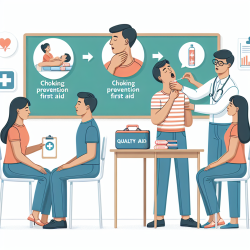Introduction
Prader–Willi Syndrome (PWS) is a complex neurodevelopmental genetic disorder characterized by hypotonia and hyperphagia, leading to an increased risk of choking. Choking is a significant cause of morbidity and mortality among individuals with PWS. Recognizing the need for enhanced caregiver education, a quality improvement (QI) project was initiated to implement choking prevention and first aid education in a multidisciplinary PWS clinic. This initiative aimed to elevate caregiver awareness and equip them with the necessary skills to manage choking risks effectively.
The Importance of Choking Prevention Education
Caregivers of individuals with PWS often lack awareness of the heightened choking risks associated with the syndrome. The QI project highlighted the necessity of standardizing choking prevention and first aid education, aiming to increase caregiver awareness from 0% to 80%. By educating caregivers, the project sought to improve their knowledge of choking prevention strategies and their comfort in administering first aid during choking incidents.
Implementing the QI Project
The QI project utilized the American Heart Association Family and Friends® CPR curriculum to provide comprehensive education. Caregivers participated in pre- and post-education assessments to gauge their awareness, knowledge, and comfort levels. The education sessions included:
- Verbal and written strategies to prevent choking, such as supervised meals and avoiding high-risk foods.
- Demonstrations of choking first aid maneuvers using CPR training mannequins.
- Distribution of educational materials for out-of-home care settings.
Throughout the 18-month intervention period, 87% of caregivers completed the education, demonstrating significant improvements in all measured areas.
Outcomes and Feedback
The project successfully increased caregiver awareness of choking risks, with post-education assessments showing that 97% of caregivers were moderately to very aware of these risks. Additionally, all participating caregivers reported enhanced knowledge of choking prevention strategies and greater comfort in providing first aid.
Feedback from caregivers was overwhelmingly positive. Many appreciated the focused training on choking prevention, which is often a smaller component of broader CPR courses. The inclusion of PWS individuals in the education sessions, where appropriate, was also well-received.
Implications for Practitioners
Practitioners working with PWS individuals can greatly benefit from implementing similar educational programs. By integrating choking prevention and first aid education into routine care, practitioners can ensure caregivers are well-prepared to manage choking risks. This approach is not only cost-effective but also enhances the overall safety and well-being of individuals with PWS.
Conclusion
The QI project underscores the importance of caregiver education in managing choking risks for individuals with PWS. By adopting these practices, practitioners can improve caregiver confidence and competence, ultimately reducing the incidence of choking-related complications. For those interested in further details, the original research paper provides comprehensive insights into the project's methodology and outcomes.
To read the original research paper, please follow this link: A Quality Improvement Project to Implement Choking Prevention and First Aid Education in Prader–Willi Syndrome Caregivers.










